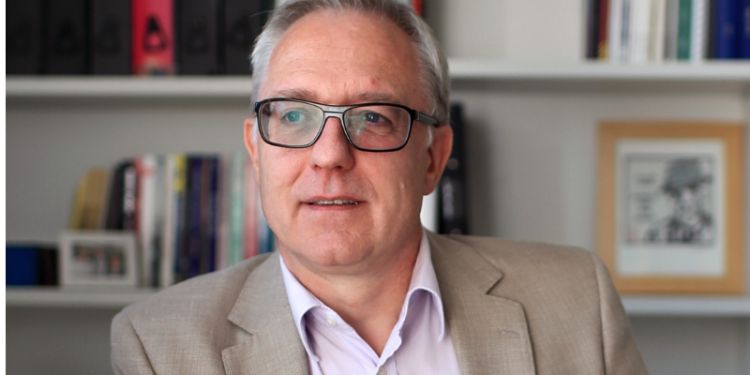Legal Professions Research Group host Liberty Scholar, Professor Julian Webb (University of Melbourne)

Participants engaged in a lively exchange on the challenges of teaching legal ethics and the responsibility of legal educators to foster critical thinking and ethical awareness among future lawyers.
The Legal Professions Research Group (LPRG) at the School of Law, University of Leeds, had the privilege of hosting a round table discussion featuring Professor Julian Webb (Melbourne Law School, University of Melbourne) the visiting Liberty Scholar here at the School of Law at the University of Leeds and a leading figure in legal ethics and legal professions research. At the event, held on 12 March 2024 for LPRG members and other colleagues in the School of Law, Professor Webb shared his insights into the dynamics of legal education, ethics, and lawyers’ professional conduct.
Professor Webb opened the round table by exploring the evolution of legal education and its profound impact on students' perceptions of their future roles. Drawing from his extensive experience, Professor Webb emphasized the need for a comprehensive understanding of legal practice, which encompasses not only doctrinal knowledge but also sociological insights and ethical considerations. He highlighted the broad spectrum of legal ethics, emphasising the need for ethics to transcend mere adherence to rules and regulations. Arguing for a contextual approach to legal ethics in his writing, Professor Webb takes into account the complex realities of legal practice and encourages thoughtful deliberation on the proper role of lawyers in society.
The conversation with LPRG members turned towards a philosophical debate on the role of lawyers, ranging from the traditional conception of lawyers as neutral technocrats to those who would wish to see lawyers as moral activists. Professor Webb navigated this nuanced terrain, advocating for a middle ground that acknowledges lawyers' moral agency while also recognizing the limits of this advocacy, particularly in cases where powerful clients may wield disproportionate influence.
One of the key themes that emerged from the discussion was the intersection of technology and ethics in the legal profession. Professor Webb cautioned against viewing technology as a panacea for ethical dilemmas, emphasizing the importance of human agency and norm-building in shaping ethical behaviour within the legal profession.
Participants engaged in a lively exchange on the challenges of teaching legal ethics and the responsibility of legal educators to foster critical thinking and ethical awareness among future lawyers. Professor Webb underscored the importance of contextualizing ethics education to make it relevant and meaningful for students, encouraging open dialogue and exploration of ethical dilemmas.
Reflecting on the event, Dr Trevor Clark, the host of the discussion, remarked, ‘Professor Julian Webb's insights have provided invaluable food for thought for our research group. His nuanced understanding of legal ethics and professionalism challenges us to rethink conventional wisdom and to strive for a more ethically informed legal practice.’
The round table discussion with Professor Julian Webb exemplified the School of Law's commitment to fostering interdisciplinary dialogue and advancing research in the field of legal professions. As the legal landscape continues to evolve, conversations like these play a crucial role in shaping the future of the legal profession.
For further inquiries, please contact:
Professor Hilary Sommerlad, Dr Trevor Clark or Mr Alex Batesmith, joint co-ordinators of the Legal Professions Research Group: h.a.k.sommerlad@leeds.ac.uk, t.g.clark@leeds.ac.uk, a.batesmith@leeds.ac.uk.




